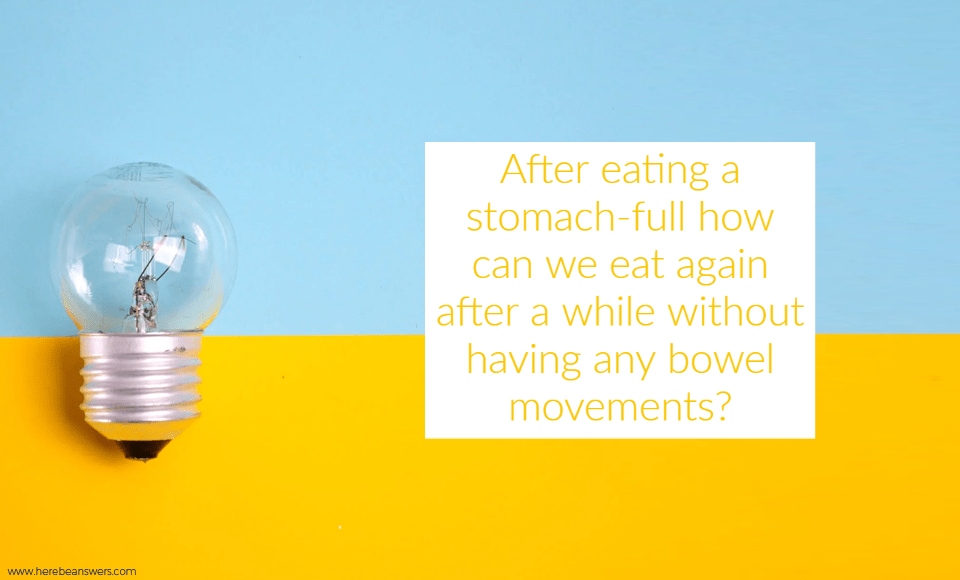It is human nature to feel hungry, and when we do, we usually grab a snack or prepare a meal to satisfy our hunger. The average person eats at least three times a day, mainly breakfast, lunch, and dinner. While some people exceed the standard three meals a day, and instead, go with a snack in between meals.
With all these said, we can say that eating is a vital part of our lives, and without it, we may not live long since our bodies require nutrients to grow and to function correctly. The nutrients that our body needs mostly comes from the food that we eat every day. Furthermore, experts developed a food pyramid, which shows the healthy foods that a person should eat.
When we eat, the food goes to our mouth, which will start the process of digestion. Our bodies have various systems, including the digestive system, which is responsible for the breakdown of foods and absorbing their nutrients to distribute to the body. The final stage of the human digestion is the bowel movement, wherein all of the indigestible solids, semisolids, and liquid waste, leave our body through the anus.
Meaning to say, every time we eat, our body breaks down food and ends up with a bowel movement. However, there are times when we eat a whole lot of food, and then after a while, we eat again. This situation seems fine until we notice that we didn’t have any bowel movement in between our meals. Going back to the earlier information, we know that our body breaks down the food that we eat. So our question is – how is it possible for us to eat again after eating a stomach-full without having any bowel movements? Is this situation good for our health?
How does our digestive system work?
First and foremost, let us gain a bit more knowledge about how our digestive system work.
The first stage of our digestion starts on our mouth. When we take our first bite until we chew our food, our salivary glands are producing saliva to breakdown food into smaller and softer particles so our body could digest it easier.
Then when we swallow our food, it will go through our throat, also known pharynx, wherein it moves to the esophagus. Our swallowing tube or esophagus is a muscular tube that acts as a bridge to our pharynx and the stomach. Between the stomach and esophagus is a valve to lock the food inside our gut and avoid going back to the esophagus.
Once the food is inside our stomach, it keeps the food inside and continues with breaking down the food into liquid or paste-like substance. The stomach does this using its acid and powerful enzymes capable of changing the overall structure of the food particles. After turning it into a paste-like substance, the stomach will pass it down to the small intestine, wherein the process of digestion continues.
Inside the small intestine, the enzymes from the pancreas, as well as bile from the liver, aids in breaking down food and digesting fat. The small intestine is also responsible for sending the food nutrients into the bloodstream. So everything that is left will be transferred to the large intestine, also known as the colon.
All of the leftovers from the small intestine are liquid and semisolid substances, which we can now consider as a stool. When it travels down our colon, its liquid is gradually getting removed from the waste, until it becomes solid, once it reaches the bottom, the sigmoid colons temporarily stores the food waste until mass movement takes place. Meaning to say, when the waste reaches the bottom, it will not automatically go out from our body since the sigmoid colon will store it first until it gets ample amounts of waste, then it would send the stool to the final stage, which is the rectum.
The rectum is the final stage of our digestion. It is responsible for storing the body waste, also known as stool until bowel movement takes place through the anus.
After learning all of these, we would get the idea that our body will not have a bowel movement every time we eat. So to answer our question, even if we eat large amounts of food, our body would easily digest the food and store it inside the rectum, and then we could eat again without having bowel movements. We just need to keep in mind that every time we eat, the process of digestion occurs, and the food will always add up to the food waste inside our rectum. Once it’s full, the process of elimination occurs.
